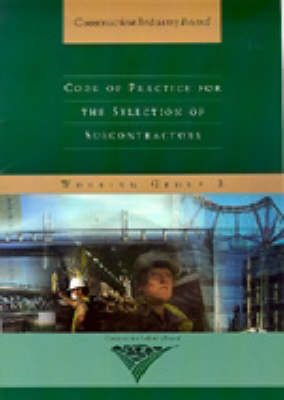This code of practice sets out the following key principles. It: seeks a commitment to short tender lists and selection on the basis of quality and price; ensures that contractors offer sub-contracts which meet the principles contained in 'Constructing the Team'; rules out Dutch auctioning; ensures that main contractors notify clients in advance of the commencement of work of the names of 'first line' subcontractors; secures a commitment from subcontractors to work co-operatively with other subcontractors. The working group for this guide was chaired by Chris Sneath from the Constructors Liaison Group. This code of practice is one of a set of documents from the CIB aimed at improving the quality, effectiveness and efficiency of the construction industry. It should be used in conjunction with the other documents in the series (1-4).The good practice recommended should be observed in commercial relationships throughout the contractual chain and throughout the duration of a construction project. Subcontractors can be selected by competitive tendering, by negotiation or as a result of partnering or a joint venture arrangement.
Competitive tendering is complex and requires everyone involved to follow a common set of procedures; inevitably it occupies the bulk of this code. In competitive tendering for small or simple works all the steps described are required but many may take place informally, and these are indicated by dotted lines in the diagrams which accompany each section of the code. Negotiation, partnering or joint ventures should all be carried out in the same spirit of good practice although specific procedures will vary. For competitive tendering to be effective in providing good value for money, it must be seen to be fair and the processes by which decisions are reached must be as open as possible.This applies to all forms of subcontractor selection.
The key principles of good practice in selecting contractors are that: clear procedures that ensure fair and transparent competition in a single round of tendering consisting of one or more stages should be followed; the tendering process should ensure receipt of compliant, competitive tenders; tender lists should be compiled systematically from a number of qualified candidates; tender lists should be as short as possible; conditions for all tenderers should be the same; confidentiality should be respected by all parties; sufficient time and information should be provided to allow the preparation of tenders appropriate to the type of works; and, tenders should be assessed and accepted having regard to quality as well as price.The above principles also include: practices that avoid or discourage collusion should be followed; tender prices should not change on an unaltered scope of works; proposed contracts should be compatible and consistent with the main contracts; suites of contracts and standard unamended contract forms from recognised bodies should be used where they are available; there should be a commitment to team work from all parties.All construction projects involve risk in a variety of areas.
Risk management, the appropriate assessment and apportionment of these risks, is essential to the success of any project. The code deals specifically with the selection of subcontractors by main contractors and the selection of sub-subcontractors by subcontractors, with particular emphasis on competitive tendering. Selection forms only part of the whole process of construction; the overall success of projects depends on other parts of the process being carried out in the same co-operative spirit. The code stresses the need for clarity and certainty at all times, whichever procurement system is chosen. Compliance with this code will result in practices such as multiple round tendering, bid peddling or 'Dutch auctioning' being rendered unacceptable.
- ISBN10 0727725424
- ISBN13 9780727725424
- Publish Date 1 January 1996
- Publish Status Unknown
- Out of Print 22 September 2014
- Publish Country GB
- Publisher ICE Publishing
- Imprint Thomas Telford Ltd
- Format Paperback
- Pages 28
- Language English
